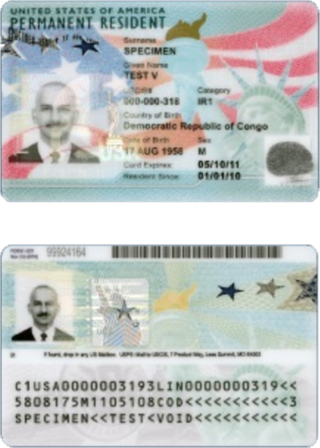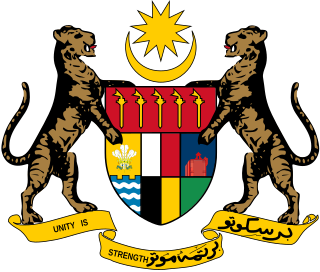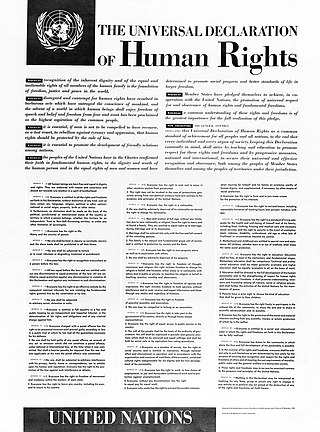Related Research Articles

Naturalization is the legal act or process by which a non-citizen of a country may acquire citizenship or nationality of that country. It may be done automatically by a statute, i.e., without any effort on the part of the individual, or it may involve an application or a motion and approval by legal authorities. The rules of naturalization vary from country to country but typically include a promise to obey and uphold that country's laws and taking and subscribing to an oath of allegiance, and may specify other requirements such as a minimum legal residency and adequate knowledge of the national dominant language or culture. To counter multiple citizenship, some countries require that applicants for naturalization renounce any other citizenship that they currently hold, but whether this renunciation actually causes loss of original citizenship, as seen by the host country and by the original country, will depend on the laws of the countries involved.

A green card, known officially as a permanent resident card, is an identity document which shows that a person has permanent residency in the United States. Green card holders are formally known as lawful permanent residents (LPRs). As of 2019, there are an estimated 13.9 million green card holders, of whom 9.1 million are eligible to become United States citizens. Approximately 65,000 of them serve in the U.S. Armed Forces.

Right of abode in Hong Kong entitles a person to live and work in the territory without any restrictions or conditions of stay. Someone who has that right is a Hong Kong permanent resident. Foreign nationals may acquire the right of abode after meeting a seven-year residency requirement and are given most rights usually associated with citizenship, including the right to vote in regional elections. However, they are not entitled to hold territorial passports or stand for office in some Legislative Council constituencies, unless they also naturalise as Chinese citizens.
Permanent residency (PR) in Canada is a status granting someone who is not a Canadian citizen the right to live and work in Canada without any time limit on their stay. To become a permanent resident a foreign national must apply to Immigration, Refugees and Citizenship Canada (IRCC), formerly known as Citizenship and Immigration Canada, under one of several programs. In addition to the conferred right of abode in Canada, a primary benefit of permanent residency is the eligibility to apply for Canadian citizenship after a certain period of permanent residency.
Australian permanent residents are residents of Australia who hold a permanent visa but are not citizens of Australia. A holder of a permanent visa may remain in Australia indefinitely. A 5-year initial travel facility, which corresponds to the underlying migration program, is granted alongside the permanent visa. Until the travel facility expires, the visa holder may leave and re-enter Australia freely. After that period the visa holder needs to re-apply for the travel facility. However, holders of a permanent visa who are already in Australia with an expired travel facility may remain in Australia indefinitely.

Permanent residency is a person's legal resident status in a country or territory of which such person is not a citizen but where they have the right to reside on a permanent basis. This is usually for a permanent period; a person with such legal status is known as a permanent resident. In the United States, such a person is referred to as a green card holder but more formally as a Lawful Permanent Resident (LPR).
The right of abode is an individual's freedom from immigration control in a particular country. A person who has the right of abode in a country does not need permission from the government to enter the country and can live and work there without restriction, and is immune from removal and deportation.

Belonger status is a legal classification normally associated with British Overseas Territories. It refers to people who have close ties to a specific territory, normally by birth or ancestry. The requirements for belonger status, and the rights that it confers, vary from territory to territory.

Malaysian nationality law details the conditions by which a person is a national of Malaysia. The primary law governing nationality requirements is the Constitution of Malaysia, which came into force on 27 August 1957.
The Permanent Resident card is an identification document and a travel document for permanent residents of Canada. It is one of the methods by which Canadian permanent residents can prove their status and is, along with the permanent resident travel document (PRTD), one of the only documents that allow permanent residents to return to Canada by a commercial carrier.

The right of abode (ROA) is an immigration status in the United Kingdom that gives a person the unrestricted right to enter and live in the UK. It was introduced by the Immigration Act 1971 which went into effect on 1 January 1973. This status is held by British citizens, certain British subjects, as well as certain Commonwealth citizens with specific connections to the UK before 1983. Since 1983, it is not possible for a person to acquire this status without being a British citizen.

Brazilian nationality law details the conditions by which a person is a national of Brazil. The primary law governing nationality requirements is the 1988 Constitution of Brazil, which came into force on 5 October 1988.

In practice, basic human rights in the British Virgin Islands (BVI) appear to be respected. Reports of repression of freedom of speech, interference with democracy or the rule of law, and arbitrary arrest and torture are generally non-existent. The BVI have been described as "generally free of human rights abuses".

Visitors to the Republic of China (Taiwan) must obtain a visa or authorization in advance, unless they come from one of the visa exempt countries or countries whose nationals are eligible for visa on arrival. All visitors must hold a passport valid for 6 months.

The Southern Africa region experiences a relatively high influx of immigration into South Africa. As of 2019, the immigration rate is continuing to increase, and the role of the female population of migrants is significantly growing in this movement and settlement. The majority of immigrants are working residents and influence the presence of several sectors in South Africa. The demographic background of this group is diverse, and the countries of origin mainly belong to Sub-Saharan Africa and push migration south. A portion have qualified as refugees since the 1990s.

The Government of the Macau Special Administrative Region allows citizens of specific countries/territories to travel to Macau for tourism or business purposes for periods ranging from 14 to 180 days without having to obtain a visa. For other entry purposes, such as establishing residence on a long-term basis, a different policy applies.
The visa policy of Canada requires that any foreign national wishing to enter Canada must obtain a temporary resident visa from one of the Canadian diplomatic missions unless they hold a passport issued by one of the 54 eligible visa exempt countries and territories or proof of permanent residence in the United States.

Non–New Zealand citizens wishing to enter the Realm of New Zealand must obtain a visa unless they are
A national without household registration (NWOHR) is a person with Republic of China nationality who does not have household registration in Taiwan. Nationals with this status are subject to immigration controls when entering the Taiwan Area, do not have automatic residence rights there, cannot vote in Taiwanese elections, and are exempt from conscription. Most individuals with this status are children born overseas to Taiwanese citizens. About 60,000 NWOHRs currently hold Taiwanese passports with this status.
Fong Yue Ting v. United States, 149 U.S. 698 (1893), decided by the United States Supreme Court on May 15, 1893, was a case challenging provisions in Section 6 of the Geary Act of 1892 that extended and amended the Chinese Exclusion Act of 1882. The provisions in question required Chinese in the United States to obtain certificates of residency, and allowed for the arrest and deportation of Chinese who had failed to obtain these certificates, even if they had not violated any other laws. The case involved writs of habeas corpus from Fong Yue Ting and two other Chinese citizens residing in New York City who were arrested and detained for not having certificates. The Supreme Court decision was in favor of the United States government, upholding the Geary Act and denying the writs of habeas corpus.
References
- 1 2 "Cook Islands Government: Permanent Residency in the Cook Islands". Cook Islands Government. Archived from the original on 29 November 2012.
- ↑ "Immigration Act review –Drafting Instructions" (PDF). Cook Islands Government. 30 October 2018. Retrieved 28 December 2020.
- ↑ Rashneel Kumar (16 January 2019). "Tougher residency rules". Cook Islands News. Retrieved 28 December 2020.
- ↑ "Crucial identity and immigration reckoning for Cook Islands". RNZ. 22 June 2020. Retrieved 28 December 2020.
- ↑ Losirene Lacanivalu (1 October 2020). "Constitutional change". Cook Islands News. Retrieved 28 December 2020.
